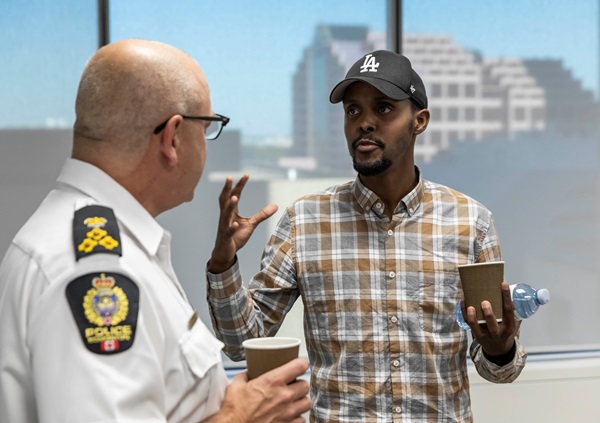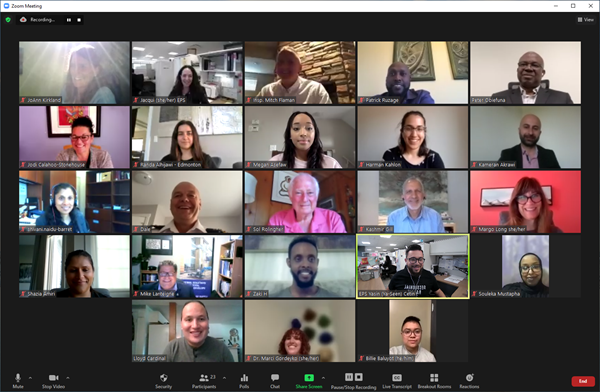“We are proud to be moving forward with a new vision of community policing that will be more responsive to the voices of our representative communities,” says Chief Dale McFee. “The community is changing and so are their expectations of policing, but by recognizing their lived experiences and desire for change, we can create a more innovative and inclusive approach to public safety in Edmonton.”
A review of the former Chief’s Advisory Council found that the model, which included eight community liaison committees, did not allow for meaningful collaboration and problem solving. These communities also expressed interest in being more involved, having a clearer purpose, and having more say in the issues affecting them.

Chief Dale McFee listens to the concerns of Zaki Hirabe, Co-Chair of the EPS Chief’s Community Council.
With calls for police reform in recent years and the launch of the EPS Commitment to Action in response, the police service created a new advisory council model to better engage with these communities, and to get them more involved in shaping community safety and well-being in our city.
Three new community advisory councils were formed to support these efforts:
- Nîsohkamâkewin Council – To help EPS with addressing the inequities and barriers Indigenous peoples face, and with implementing the policing recommendations from national reports such as the Truth and Reconciliation Commission of Canada, and the National Inquiry into Missing and Murdered Indigenous Women and Girls.
- Sexual Orientation, Gender Identity and Expression (SOGIE) Council – To guide EPS in supporting members of the 2SLGBTQ+ community, and with putting the EPS 2SLGBTQ+ Community Feedback Report into practice.

During the pandemic, council recruitment as well as meetings were moved online to keep the momentum going.
Despite the challenges of the pandemic, a robust recruiting process for the three councils began in 2021 and continued through 2022, and 40 individuals were selected representing a diverse range of voices, perspectives, and experiences from the community.
With all three councils now in place, they will be working with police to ensure meaningful engagement, address systemic issues, and implement initiatives that make a positive difference in people’s lives.
“EPS has a huge role to play in making systemic change and helping the community heal, and listening to the community will help bridge the communication gap and earn trust and respect,” says Zaki Hirabe, Co-Chair of the Chief’s Community Council. “My goal is to bring the voices of the community and the youth forward, and having different voices within the councils from multiple fields, ages, genders and races can bring a lot of change if they are listened to and taken into consideration.”
For more information on the EPS community advisory councils, please visit www.edmontonpolice.ca/communitycouncils.